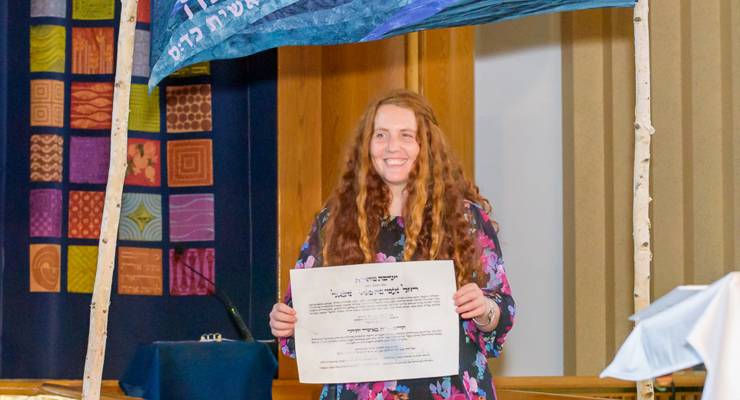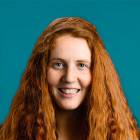
A few years ago, I learnt that the sign for “Jew” in American Sign Language is a three-finger motion of stroking one’s chin, demonstrating a sagely beard.
It’s not surprising when someone thinks of a Jew that they conjure up a bearded rabbi. Judaism is more than 3500 years old, and its leaders have been male for most of this time. But if a new movement within Orthodox Judaism has its way, American Sign Language may soon need an update.
I was born into a Jewish family with a deep love and reverence for Orthodox tradition. My ancestors emigrated to Ballarat from America in the late 1880s for the gold rush and are buried in the Jewish section of Ballarat’s cemetery. My dad’s family tree is full of rabbis, with my great-great-grandfather receiving a special visa just for rabbis to emigrate from Europe to British Mandatory Palestine in the 1930s, which allowed him to survive the Holocaust. We’ve been Jewish forever, but none of my female ancestors had access to any of the training available to male rabbis.
Recently, I became the first Australian woman to complete a four-year rabbinic ordination program at the New York-based organisation Yeshivat Maharat, the first worldwide to ordain Orthodox Jewish women. I join 64 other women globally who are ordained Orthodox female rabbis, alongside 100 others currently in training.
Orthodox Jewish women who become rabbis are the ultimate underdogs. We are part of an ancient tradition that will never count us in a prayer quorum and will always forbid us from being witnesses in a Jewish court of law — no matter how much Jewish knowledge we have.
Despite this, I’ve spent four years studying, in Aramaic and Hebrew, the foundational concepts that shape Jewish life, such as the laws of Kosher, Sabbath, family life, conversion, mourning and death. I am qualified to serve as a hospital and prison chaplain in Australia, and I completed regular assignments and exams.
Alongside my day job and raising my brood of small children, this was no easy feat. Many in my community will never recognise my qualification, but that doesn’t bother me — my very existence as an Orthodox female rabbi is revolutionary in this country. I know there is a thirst for qualified Jewish women who can add their voices to the tradition, lead from the front and fill a massive void of women holding public positions of leadership.
The rabbinical school that ordained me, Yeshivat Maharat, was founded in 2009 by my mentor, Rabba Sara Hurwitz, and her rabbi, Avi Weiss. It aims to educate, ordain and invest in passionate and committed Orthodox women who model a dynamic Judaism to inspire and support individuals and communities.
Today it has students from across the globe, including women like me who want to see Orthodox Judaism improve at including women in all areas of public Jewish life. In fact, Yeshivat Maharat is one of America’s fastest-growing rabbinical schools. At a time when many are choosing not to engage with religion, and many rabbinical schools are shrinking, the enrolments at Yeshivat Maharat are going gangbusters.
Why? Because women are excited about opportunities that provide education and access to Jewish texts never before offered to us. Instead of gatekeeping access to Judaism’s most foundational texts, as many men have for millennia, Yeshivat Maharat is determined to democratise access and train women to read and understand them, as well as add their own interpretations, no matter where they are located.
In the 21st century, an ancient religion like Judaism is on the precipice. Women have excelled in so many areas of civic life and contributed to medicine, law and policy. But within Orthodox Judaism, especially in Australia, our leadership is still pale, male and stale.
Many within Orthodox Judaism are unhappy that women are studying the same curriculum as male rabbis and calling themselves female Orthodox rabbis. But if I sat and studied the same curriculum as a man, and completed all the same rabbinic ordination tests, why shouldn’t I have a title?
American rabbis have been particularly vicious in their condemnation of women taking on titles and studying for rabbinic ordination, noting:
These developments represent a radical and dangerous departure from Jewish tradition, and must be condemned in the strongest terms. Any congregation with a woman in a rabbinical position of any sort cannot be considered Orthodox.
And yet, despite the fierce pushback, Orthodox Jewish women refuse to back down. Our souls are craving access to text and tradition. Ancient religions may not like change, but women deserve to be considered for leadership roles if we have the knowledge and training.
Australia may be far from global Jewish centres like New York or Jerusalem, but our communities still deserve the best representation. If no one takes the plunge to be one of the first, how will others see it as possible for themselves?








Just because it’s “tradition” doesn’t make it necessarily right or good. Sadly, in all religions there will always be fundamentalist zealots.
I wish you all the best, Nomi. So much knowledge, experience and depth of understanding is lost when we only allow half the world’s population a say.
Mazal Tov!
Enjoyed the article Nomi. My paternal great grand parents were founders of Temple Beth Israel in St.Kilda, a progressive (or as we called it back then, liberal) congregation. In the 1970’s they employed a female rabbi, something that horrified my mother, who came from a more conservative background. I wish you all the best.
The more I hear about Judaism, the more similar it seems to Islam.
And the female Islamic Imams are?
All monotheistic religions have a lot in common but this article is about the first woman orthodox Rabbi in Australia. More power to her. Shame she couldn’t knock off the scumbag Southwick when she ran as a teal candidate in the last Victorian State election for the seat of Caulfield; lost it in the postal votes during Daniel Andrews landslide victory.
Bernard Lewis FBA, scholar of M/E monotheisms and foremost Arabist of the 20thC, described the koran as “…the torah & talmud editted and simplified for the arab mind“.
When’s Rundle coming back?